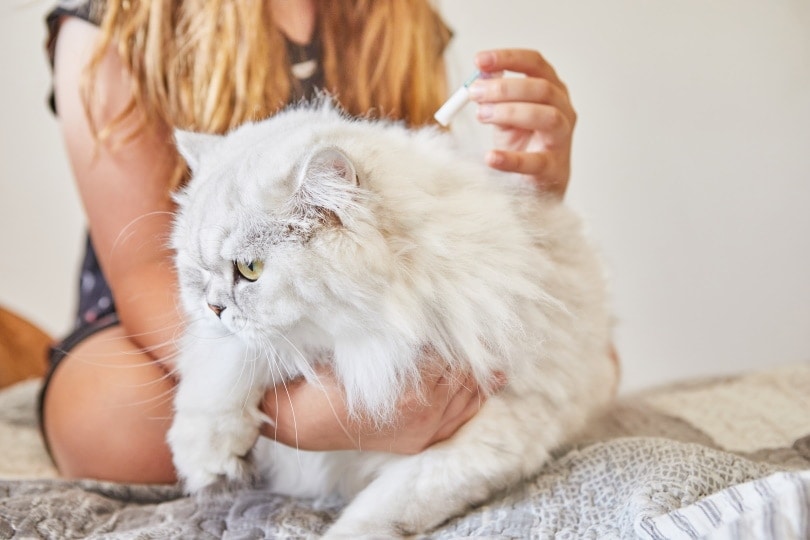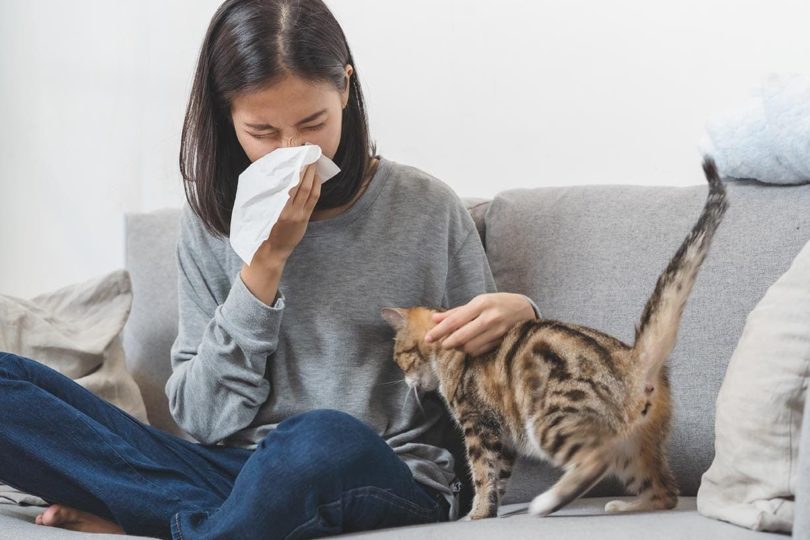Does Tea Tree Oil Kill Fleas? Vet-Reviewed Safety & Effectiveness
Updated on

Being a pet owner means dealing with pesky fleas in the spring and summer months. Pet owners are always looking for ways to kill these pesky critters safely and effectively that will kill fleas and not harm their pets. With the Internet being our prime source for finding out such information, you may have come across using tea tree oil as an effective method.
Does tea tree oil kill fleas? And more importantly, is it safe? No, it is not safe. While the oil may kill fleas when used in high doses, it is not advised as this oil is toxic for dogs.
We recommend that your first stop for effective and safe flea treatment and prevention products should be your veterinarian.
 Why You Should Never Use Tea Tree Oil to Kill Fleas
Why You Should Never Use Tea Tree Oil to Kill Fleas
Tea tree oil is an essential oil derived from the leaves of the tea tree, commonly found in Australia. Tea tre oil is easily found in retail stores and online. Regarding using it to kill fleas, the oil is considered risky because the contents are not regulated for safety and effectiveness, meaning you don’t really know what you’re getting in any given bottle. You may read that you can dilute the tea tree oil before applying it to your pet; however, pets may lick the oil off the coat, which can make them very sick, even in a diluted form. However, pets do not even need to ingest the oil, topically applied, it will also intoxicate them. Bischoff and Guale reported a clinical case of toxicity and death of a cat that was given tea tree oil to combat flea infestation.1
Are Topical Flea Ointments More Toxic than Tea Tree Oil?
Topical flea ointments are regulated and deemed safe to use on pets by the FDA, whereas tea tree oil or other essential oils are not regulated for the purpose of killing fleas and can make your dog sick and may even kill your cat; this is why it’s important to purchase flea medications through your veterinarian to ensure you’re providing the correct flea treatment catered to your pet.
For instance, certain flea products contain a chemical that targets the chemical components found in insects that are not found in mammals. Other categories of chemicals may be safe for dogs but are toxic to cats. A class of chemicals called pyrethrins are chemicals that cannot be used on cats but is perfectly safe for dogs.
Some commercial flea products contain safe chemicals that not only kill adult fleas but also kill the eggs and the next generation of fleas. For example, any eggs that a female lays before she succumbs to the flea medication will not be able to hatch, whereas there is no conclusive evidence that tea tree oil or other essential oils are effective in killing flea eggs.

Can I Use Other Essential Oils That Are Safe?
If you’re a cat owner, you should stay away from essential oils, as essential oils largely are toxic to cats. A cat’s liver is not able to break down essential oils, meaning it cannot eliminate them from your cat’s system. Purchasing flea treatments from your veterinarian is the safest and most effective way to kill fleas on your cat without harming your cat in the process.
Our canine pets are also vulnerable to essential oils, and if you have pets, it is best to avoid using them in your house. A rule of thumb is that natural products do not always equal safety.
Tips for Keeping Your Pet Healthy and Safe
Keeping your pet on the flea and tick prevention provided by your veterinarian is the safest option, and your veterinarian can prescribe a suitable and safe treatment option for your particular pet. Flea and tick preventatives come in a variety of choices, such as flea and tick collars, oral products, and topical solutions. By purchasing flea and tick products from your veterinarian, you are sure the treatment will be safe and effective.

Conclusion
Fleas are not only annoying but can spread diseases. Your pet can become infected with tapeworms if an infected flea is swallowed. Other possible diseases that can be transmitted by fleas and ticks are typhus, Lyme disease, Mycoplasma haemofelis, and the list goes on to include all the tick-borne diseases.
With these possible diseases, plus the risk of flea allergies it’s better to skip home remedies for safety and effectiveness reasons and purchase safe preventatives from your veterinarian.
Featured Image Credit: ronstik, Shutterstock

 Why You Should Never Use Tea Tree Oil to Kill Fleas
Why You Should Never Use Tea Tree Oil to Kill Fleas









